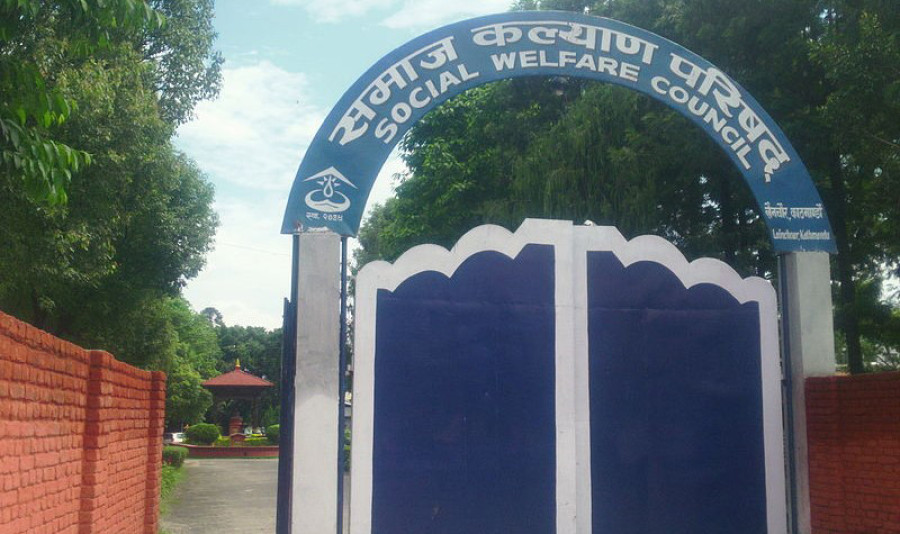National
Social Welfare Council powerless in controlling high administrative cost of foreign NGOs
The administrative costs were as high as 65 percent in some projects.
Prithvi Man Shrestha
Social Welfare Council, the regulator of non-governmental organisations, is powerless in preventing foreign NGOs from surpassing their administrative costs over the set threshold.
As per the Project Agreement Appraisal Guidelines prepared by the council, foreign NGOs should not exceed 20 percent of the total project cost. The same provision has also been made in the Development Cooperation Policy 2019.
But monitoring and evaluation reports of a number of the foreign NGOs show that some of them have exceeded the threshold.
For example, the administrative cost of the National Conservation Priorities Area, a project run by the World Wide Fund for Nature (WWF), stood as high as 28 percent—65 percent in different years, according to a mid-term evaluation report prepared in 2017.
In the fiscal year 2012-13, the first year of the five year project, the administrative costs had reached as high as 65 percent, and it was 38 percent in the fiscal year 2014-15.
Likewise, the Sacred Himalayan Landscape Program, another project under the WWF, also had administrative costs reaching 30 percent from 19 percent, another mid-term evaluation report stated.
Sacred Himalayan Landscape–Langtang National Park Buffer Zone Support Project was launched to look after the protected areas and buffer zone within/around Langtang National Park, Rasuwa.
"The WWF Nepal should look to keep the administration costs within 20 percent of the total cost. The contrary can result in a weak financial efficiency of the programme," the evaluation report stated.
But Durga Prasad Bhattarai, information officer at the council expressed helplessness in enforcing the rule. "We don't have any legal rights to penalise foreign NGOs whose administrative expenses cross the threshold," he said. "We have been advising them to reduce such costs."
He, however, said that the council is looking to make provisions to discourage high administrative costs in a planned new law on guiding the non-governmental sector.
A mid-term evaluation report on 'Udaan-Catching the Missed Opportunity Project' run by 'Care Nepal', in 2017, also showed that the project failed to maintain the administrative costs below 20 percent.
The project aimed to empower approximately 450 girls from poor, vulnerable and socially excluded families who have never been to a school or dropped out from school to complete their primary and/or secondary education.
According to the evaluation report, the administrative cost of the project stood at 21.32 percent.
Kidasha, a UK-based NGO, was also found to have exceeded the threshold for administrative cost in a project called "Improving the health, learning, and wellbeing of excluded children and families."
Its evaluation report in 2019 found that the organisation's administrative cost in the fiscal year 2015-16 stood at 14 percent, which rose to 21 percent in the fiscal year 2016-17 and 26 percent in 2017-18.
But Hitman Gurung, programme support manager at Kadisha, had claimed back in September last year to the Post that the administrative costs had crossed the threshold due to mistaken calculation of costs by the evaluation team.
Representatives of foreign NGOs say keeping administrative costs below 20 percent was challenging, particularly in remote areas. "Because of high staff mobility costs, vehicle running costs, travel time and high staff numbers, administrative cost for projects run in remote areas remain high," said Achyut Luitel, chairperson of the Association of International NGOs in Nepal.
Domestic NGOs say there are two other factors responsible for high administrative cost.
Jitram Lama, the president of NGO Federation, said that foreign NGOs running the programmes by themselves instead of assigning the job to local partners and foreign staff mobilisation contribute to the high administrative cost of foreign NGOs.
"Our position has been that the foreign NGOs should not run programmes at the local level by themselves," said Lama.
But Luitel said foreign NGOs are compelled to run some programmes by themselves due to poor capacity of local NGOs.
"Foreign NGOs have been running programmes through local partners in most of the cases," he claimed. He also said that the number of foreign staff members has been on the decline in recent years.




 9.7°C Kathmandu
9.7°C Kathmandu














